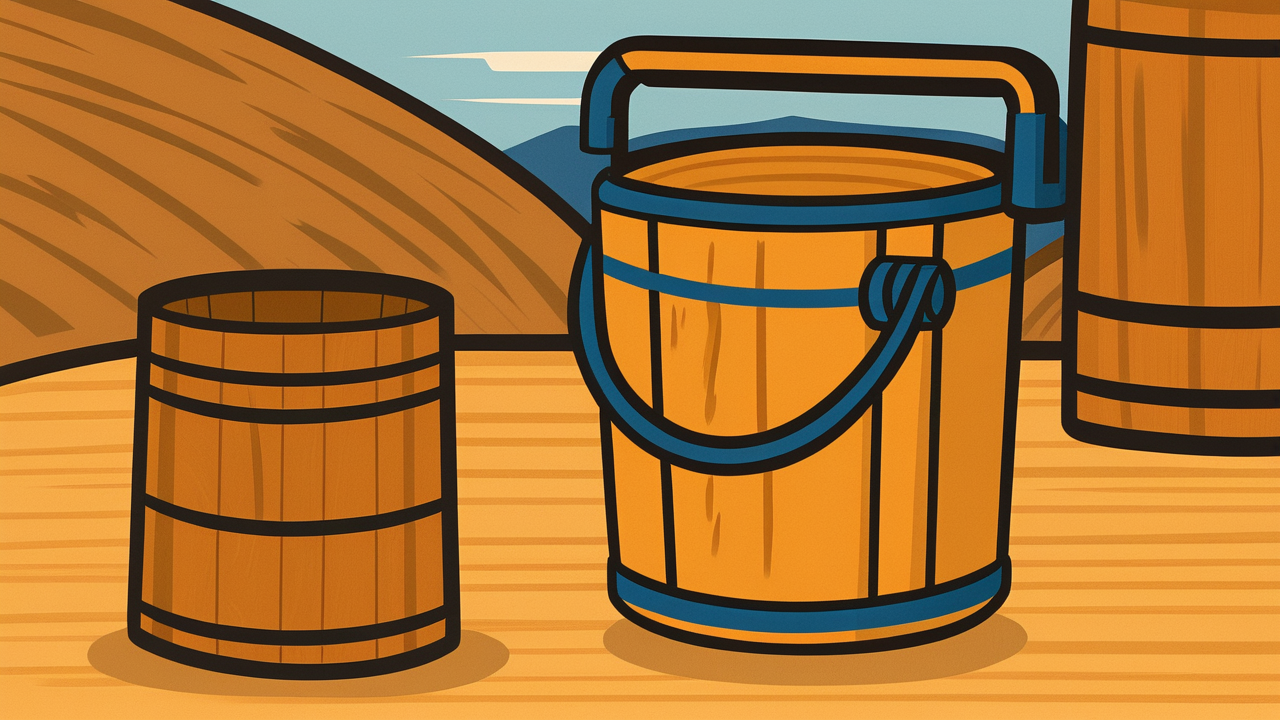How to Read “風が吹けば桶屋が儲かる”
Kaze ga fukeba okeya ga moukaru
Meaning of “風が吹けば桶屋が儲かる”
This proverb represents forcibly connecting seemingly completely unrelated things through contrived reasoning.
In other words, it is used as an expression to ridicule logical leaps or forced reasoning. From the way it forcibly relates wind and bucket makers—things that would normally have no connection—through multiple stages, it is used to critically express far-fetched reasoning or speculation with weak foundations. This proverb is used when someone gives an illogical explanation or claims overly roundabout and unrealistic cause-and-effect relationships. By saying “That’s like a story where if wind blows then bucket maker profits,” you can point out the unreasonableness of that logic. Even today, it remains a useful expression for conveying the irrationality of overly complex reasoning or contrived explanations.
Origin and Etymology
The origin of “If wind blows then bucket maker profits” is said to have emerged as satirical logic appearing in Edo period rakugo and humorous books. This expression amusingly depicted the forcible connection of seemingly completely unrelated events through contrived reasoning.
The chain of logic goes as follows: When wind blows, dust swirls up and gets in people’s eyes, increasing the number of blind people. Blind people often make their living playing shamisen, so demand for shamisen increases. Since cat skin is used for shamisen, cats are caught in large numbers. When cats decrease, rats multiply, and rats gnaw holes in buckets. Therefore, demand for buckets increases, and bucket makers profit.
This story was beloved among common people of the Edo period and spread especially as a topic in variety halls and teahouses. People of that time enjoyed such absurd logical developments while simultaneously using them as opportunities to think about cause-and-effect relationships. This proverb, which is still recorded in many dictionaries and literature today, has become established as a representative expression of Japanese wit and humor.
Interesting Facts
The “bucket makers” mentioned in this proverb were actually an important profession in the Edo period. Since there was no running water at the time, bucket makers who made buckets essential for daily life—for drawing well water, bathtubs, washing tubs, and so on—could be found throughout towns.
It was also true that cat skin was used for shamisen, with the belly skin of female cats particularly prized for its sound quality. For this reason, there was even a profession called “cat catchers” in the Edo period.
Usage Examples
- Such complex reasoning is like a story where if wind blows then bucket maker profits—it’s not realistic
- His explanation follows the logic of if wind blows then bucket maker profits, and I can’t accept it at all
Modern Interpretation
In modern society, the meaning of this proverb has changed significantly. Originally an expression criticizing “forced connections,” it is now increasingly used in a positive sense to represent “butterfly effects” or “complex cause-and-effect relationships.”
In our information society and global economy, we witness many instances where distant events have unexpected influences. For example, small political changes overseas affect stock prices, which then ripple into our daily lives. Minor posts on social media can go viral and impact corporate performance.
Against this backdrop, “If wind blows then bucket maker profits” has come to be used when explaining the complex cause-and-effect relationships of modern society. In the business world, this proverb is sometimes quoted when discovering unexpected connections between seemingly unrelated industries.
However, this is clearly the opposite of its original meaning. People from the Edo period might be surprised to hear this, but language changes with the times. Today, both the ironic usage and the usage expressing complex cause-and-effect relationships exist, requiring judgment based on context.
When AI Hears This
The chain reaction that Edo period people envisioned—”wind → dust → eye disease → increased shamisen demand → cat decline → mouse increase → bucket damage → cooper profits”—is a perfect example of what modern complexity theory calls a “nonlinear system.”
The most crucial aspect of this causal chain is the “amplification effect” at each stage. Even if just 1% more people develop eye problems from wind and dust, shamisen demand could surge by over 10%. This is because for people with visual impairments, the shamisen wasn’t merely a hobby—it was a means of livelihood. Furthermore, each shamisen required the skin of three cats, and the loss of just one cat allows mice to multiply exponentially. Mice reproduce at an astounding rate of 6-8 offspring per month.
Modern chaos theory calls such chain reactions “sensitive dependence on initial conditions.” This is structurally identical to the butterfly effect discovered by meteorologist Lorenz—the idea that a butterfly’s wings flapping in Brazil could trigger a tornado in Texas.
The common people of Edo understood, without mathematical proof, that in complex social systems, “indirect chain reactions” have far greater impact than “direct causal relationships.” This is evidence that they intuitively grasped the essence of what modern economics and network theory call “emergent phenomena”—300 years ahead of their time.
Lessons for Today
What this proverb teaches modern people is the importance of viewing things from multiple angles. While we should certainly avoid forced connections, we mustn’t forget that unexpected links might be hidden between seemingly unrelated matters.
In modern society, specialized fields have become subdivided, and we tend to confine ourselves to our own domains. However, innovation often emerges from combinations of different fields. By considering unexpected combinations like wind and bucket makers, we might find new ideas or solutions.
What’s important is maintaining a sense of balance. Not being swayed by unfounded speculation while simultaneously not being too trapped by fixed ideas. This proverb teaches us to value both logical thinking and flexible imagination. You too should sometimes exercise your imagination by wondering “What would happen if wind blew?” There might be new discoveries there.



Comments